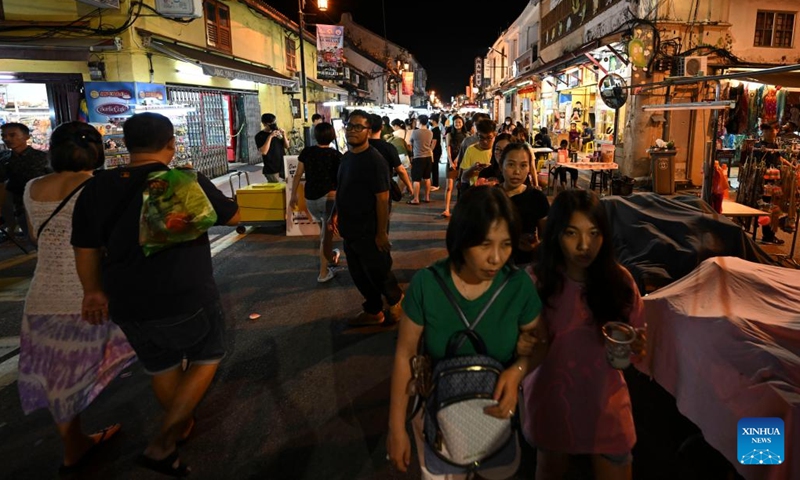
Tourists visit the Jonker Street night market in Malacca, Malaysia, June 18, 2023. Malacca, located on the northern shore of the Strait of Malacca, is a historic city and capital of the state of Malacca.(Photo: Xinhua)
The summer travel season has seen a surge in demand for outbound travel, particularly to Southeast Asia. However, the recovery is still hindered by factors such as visa requirements and limited international flights, the Global Times learned from tourism platforms.
Graduation season and the summer break have seen a doubling in the demand for outbound travel compared to 2019, and orders for overseas travel services such as flights, insurance, and hotels have increased rapidly, according to online travel platform Trip.com.
The current focus of summer outbound travel is on short-haul trips. Japan, Singapore, South Korea, Thailand and Malaysia are the top five most popular destinations for visa applications during the summer season, Trip.com said.
Spring Travel has also seen an increase in demand for trips to Spain, Portugal, France, Switzerland, and the Balkans. Additionally, off-season trips to South Africa during the summer season have become popular.
Since the beginning of this year, China's inbound and outbound tourism has been gradually recovering in an orderly manner. A report released by the World Tourism Alliance showed the prosperity index for China's outbound travel market in the first half of 2023 exceeded the level of the first half of 2019.
However, long-haul outbound trips are still limited due to the time-consuming visa application process for many European countries and the US, according to industry insiders.
For example, in Shanghai, it takes 117 working days to process a tourist visa for Germany, while Switzerland is relatively fast at 54 working days, a customer service representative for Trip.com told the Global Times.
Zhou Weihong, deputy general manager of Spring Travel, said that the limited reception capacity for Schengen visas in Europe has made it difficult to match the market demand.
“Although some countries have opened up for group tourism, they have not yet opened up group visas. These factors are affecting the progress of outbound travel recovery,” Zhou told the Global Times on Wednesday.
FlightAI, a market insight platform, predicted that this year's summer outbound travel may experience "high inquiries, high ticket prices, and low capacity" compared to the same period in 2019.
Although the search volume for outbound travel in 2023 has exceeded that of 2019 by 16 percent, the capacity has decreased by 48 percent compared to the same period, it said.
Before the COVID-19 pandemic, the Chinese mainland had the largest outbound travel market in the world, both in terms of the number of trips and the total spending.
According to a McKinsey report, in 2019, Chinese mainland tourists took 155 million outbound trips, totaling $255 billion in travel spending. China is also an important source market for some major destinations, making up 28 percent of inbound tourism for Thailand, 30 percent for Japan, and 16 percent of non-EU visitors to Germany.
Spring Travel predicted that this fall will be a more suitable season and time for elderly people and young people to take outbound vacations.
“The weather will be more comfortable, and the scarcity of outbound tourism resources will also be alleviated to some extent,” Zhou said.

